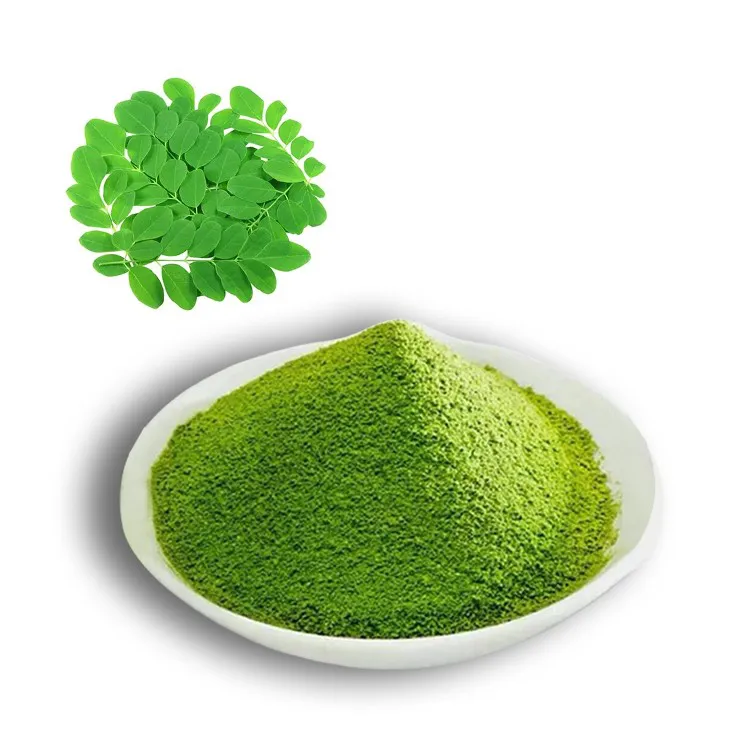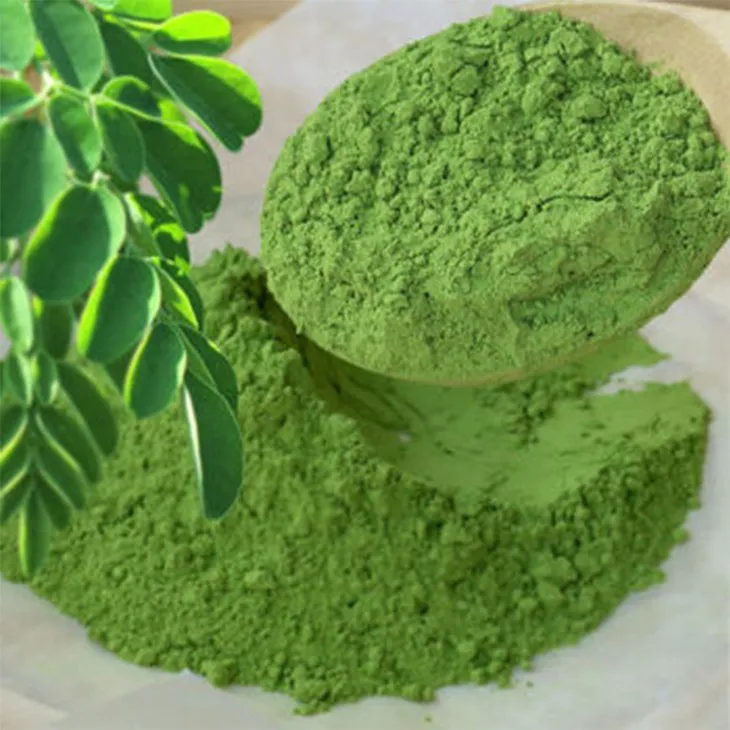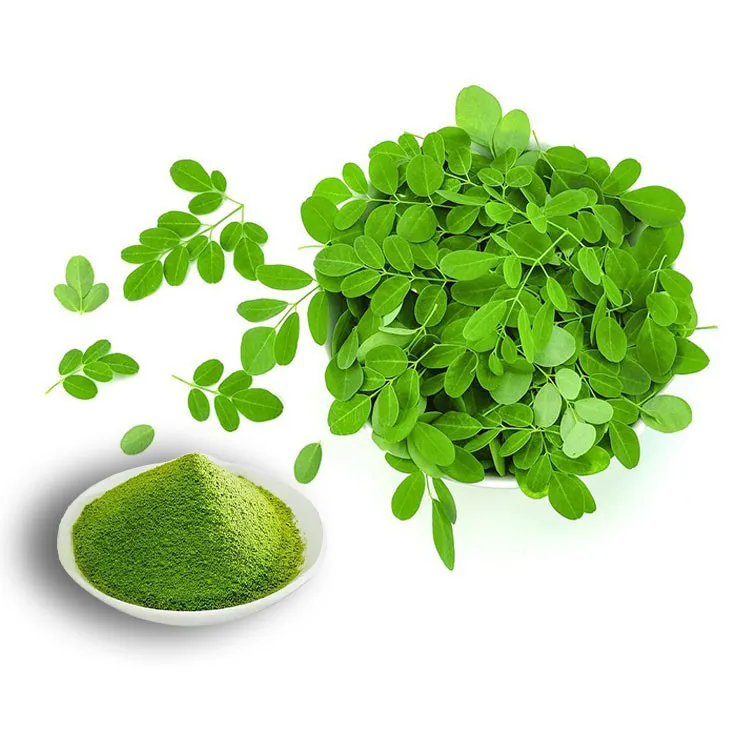- 0086-571-85302990
- sales@greenskybio.com
Moringa powder can reduce high blood pressure.
2024-11-14

1. Introduction
High blood pressure, or hypertension, is a common and serious medical condition that affects a significant portion of the global population. It is a major risk factor for various cardiovascular diseases, including heart attacks, strokes, and heart failure. While there are several conventional medications available for managing hypertension, there has been growing interest in exploring natural alternatives or complementary therapies. Spicy wood powder, also known as Moringa oleifera powder, has emerged as a potential candidate in this regard. Moringa oleifera is a plant native to parts of South Asia and has been used in traditional medicine for centuries. In recent years, scientific research has begun to uncover the various properties of Moringa oleifera that may contribute to its role in reducing high blood pressure.

2. Nutritional Composition of Moringa oleifera Powder
The potential blood - pressure - reducing effects of Moringa oleifera powder can be attributed, in part, to its rich nutritional profile.
2.1 Vitamins
Moringa oleifera powder is a rich source of vitamins. It contains significant amounts of vitamin C, which is an antioxidant that helps protect the blood vessels from oxidative stress. Vitamin E, another antioxidant vitamin present in the powder, also plays a role in maintaining the integrity of the endothelial cells lining the blood vessels. Additionally, vitamins such as vitamin B6 are involved in various physiological processes related to blood pressure regulation, including the metabolism of homocysteine. High levels of homocysteine have been associated with an increased risk of hypertension.
2.2 Minerals
The powder is also rich in minerals. Potassium is one of the most important minerals in relation to blood pressure. A diet rich in potassium can help counteract the effects of sodium and promote the excretion of sodium from the body, which in turn can lower blood pressure. Moringa oleifera powder contains a relatively high amount of potassium. It also contains calcium and magnesium, which are involved in muscle contraction and relaxation, including the smooth muscles in the blood vessel walls. Imbalances in these minerals can affect blood vessel tone and contribute to hypertension.
2.3 Amino Acids
Moringa oleifera powder contains a variety of amino acids. Some of these amino acids are precursors for the synthesis of important biological molecules. For example, arginine is a precursor for nitric oxide. Nitric oxide is a signaling molecule that plays a crucial role in relaxing blood vessels, thereby reducing blood pressure. By providing the necessary amino acids, Moringa oleifera powder may support the production of nitric oxide and contribute to blood pressure regulation.
2.4 Phytochemicals
The plant also contains numerous phytochemicals. These include flavonoids, phenolic acids, and glucosinolates. Flavonoids have antioxidant, anti - inflammatory, and vasodilatory properties. They can help relax the blood vessels and reduce oxidative stress, both of which are beneficial for blood pressure control. Phenolic acids also contribute to the antioxidant activity of the powder, while glucosinolates may have other health - promoting effects, although their exact role in blood pressure reduction is still being investigated.

3. Scientific Research on Moringa oleifera and Blood Pressure
3.1 Animal Studies
Several animal studies have been conducted to investigate the effects of Moringa oleifera on blood pressure. In rodent models of hypertension, animals fed with Moringa oleifera - supplemented diets showed significant reductions in blood pressure compared to those on a control diet. These studies have suggested that the various components of Moringa oleifera, such as its bioactive compounds and nutrients, may work together to exert a hypotensive effect. For example, in some studies, the increase in nitric oxide production and the improvement in endothelial function were observed in the animals treated with Moringa oleifera. These effects are likely related to the presence of arginine and flavonoids in the plant, which can enhance nitric oxide synthesis and reduce oxidative stress in the blood vessels.
3.2 Human Studies
While the number of human studies on Moringa oleifera and blood pressure is relatively limited, some promising results have been reported. In some small - scale clinical trials, participants who consumed Moringa oleifera powder or extracts showed a trend towards lower blood pressure over a certain period. However, it is important to note that these studies often had limitations, such as small sample sizes and relatively short durations. Larger and more comprehensive human studies are needed to further confirm the blood - pressure - reducing effects of Moringa oleifera in humans. Nevertheless, the existing human studies, along with the more extensive animal research, provide a basis for further exploration of Moringa oleifera as a potential natural remedy for hypertension.

4. Mechanisms of Blood Pressure Reduction
4.1 Vasodilation
One of the main mechanisms by which Moringa oleifera powder may reduce blood pressure is through vasodilation. As mentioned earlier, the presence of nitric oxide - enhancing components such as arginine and flavonoids can lead to an increase in nitric oxide production. Nitric oxide diffuses into the smooth muscle cells of the blood vessel walls and activates guanylate cyclase, which in turn increases the production of cyclic guanosine monophosphate (cGMP). cGMP causes the smooth muscles to relax, leading to dilation of the blood vessels. This dilation reduces the resistance to blood flow, and as a result, blood pressure decreases.
4.2 Antioxidant and Anti - inflammatory Effects
The antioxidant and anti - inflammatory properties of Moringa oleifera powder also play a role in blood pressure regulation. Oxidative stress and inflammation are often associated with hypertension. By reducing oxidative stress through its antioxidant vitamins (such as vitamin C and E) and flavonoids, Moringa oleifera powder can protect the endothelial cells from damage. Damaged endothelial cells can release substances that promote vasoconstriction and inflammation. Additionally, the anti - inflammatory effects of the powder can help reduce chronic inflammation in the blood vessels, which is another factor contributing to high blood pressure.
4.3 Renin - Angiotensin - Aldosterone System (RAAS) Modulation
The RAAS is an important hormonal system involved in blood pressure regulation. Some components of Moringa oleifera powder may have an impact on this system. For example, certain phytochemicals may inhibit the activity of renin, an enzyme that initiates the RAAS cascade. By inhibiting renin, the production of angiotensin II, a potent vasoconstrictor, can be reduced. This, in turn, can lead to a decrease in blood pressure. However, more research is needed to fully understand the interactions between Moringa oleifera and the RAAS.
5. Incorporating Moringa oleifera Powder into a Hypertension - Management Plan
5.1 Dietary Incorporation
One of the simplest ways to incorporate Moringa oleifera powder into a hypertension - management plan is through dietary means. It can be added to smoothies, soups, or salads. For example, adding a teaspoon of Moringa oleifera powder to a morning smoothie can provide a boost of its beneficial nutrients. When adding it to soups, it can blend well with other ingredients and enhance the nutritional value of the dish. In salads, it can be sprinkled on top for an added health - promoting touch. However, it is important to note that Moringa oleifera powder has a strong flavor, so it may need to be adjusted according to personal taste preferences.
5.2 Dosage Considerations
The appropriate dosage of Moringa oleifera powder for blood pressure management is still not fully established. In general, starting with a small dose, such as 1 - 2 grams per day, and gradually increasing it while monitoring blood pressure is a reasonable approach. However, it is crucial to consult with a healthcare provider before starting any new supplement regimen, especially for individuals with hypertension or other underlying health conditions. The healthcare provider can take into account the individual's overall health status, medications, and other factors to determine the safest and most effective dosage.
5.3 Compatibility with Medications
For individuals taking medications for hypertension, it is important to consider the compatibility of Moringa oleifera powder with these drugs. While there is currently limited research on potential interactions, it is possible that Moringa oleifera may interact with some medications. For example, if it has an effect on the RAAS, it could potentially interact with drugs that target the same system. Therefore, it is essential to inform the healthcare provider about the use of Moringa oleifera powder to ensure that there are no adverse interactions.
6. Conclusion
In conclusion, Moringa oleifera powder shows potential as an aid in reducing high blood pressure. Its rich nutritional composition, including vitamins, minerals, amino acids, and phytochemicals, along with its various biological activities, such as vasodilation, antioxidant, anti - inflammatory, and potential modulation of the RAAS, provide a scientific basis for its possible role in hypertension management. However, more research, especially large - scale human studies, is needed to confirm its effectiveness and safety in humans. For those interested in incorporating Moringa oleifera powder into their hypertension - management plan, it should be done with caution, in consultation with a healthcare provider, and with careful consideration of dosage and potential interactions with medications.
FAQ:
1. What are the main nutrients in Moringa oleifera powder that may help reduce high blood pressure?
Moringa oleifera powder is rich in nutrients such as potassium, magnesium, and various antioxidants. Potassium helps in balancing sodium levels in the body, which is crucial for blood pressure regulation. Magnesium also plays a role in relaxing blood vessels. Antioxidants in it can help reduce oxidative stress that may be associated with high blood pressure.
2. How does Moringa oleifera powder affect blood vessels to reduce blood pressure?
The bioactive compounds in Moringa oleifera powder may help relax blood vessels. Some components can act on the smooth muscle cells of blood vessels, causing them to dilate. When blood vessels dilate, the resistance to blood flow decreases, which in turn can lead to a reduction in blood pressure.
3. Is it safe to use Moringa oleifera powder for high - blood - pressure management?
Generally, when used in moderation, Moringa oleifera powder is considered safe for most people. However, some individuals may be allergic to it. Also, it should not be used as a sole treatment for high blood pressure. It is advisable to consult a healthcare provider before starting to use it, especially if one is taking other medications for hypertension.
4. How can one incorporate Moringa oleifera powder into a daily diet for blood pressure management?
One can add Moringa oleifera powder to smoothies, juices, or sprinkle it on salads. It can also be used in cooking, for example, added to soups or stews. However, it is important to note that the taste can be strong, so it should be added gradually to find an acceptable amount.
5. Are there any scientific studies specifically on Moringa oleifera powder and high blood pressure?
Yes, there are several scientific studies. Some studies have shown that the consumption of Moringa oleifera powder can have a positive impact on blood pressure parameters in animal models and in some human observational studies. However, more research, especially large - scale clinical trials, are still needed to fully understand its effectiveness and safety for blood pressure reduction.
Related literature
- The Effects of Moringa oleifera on Blood Pressure: A Systematic Review"
- "Moringa oleifera: Nutritional Composition and Potential Role in Hypertension"
- "Bioactive Compounds in Moringa oleifera and Their Impact on Cardiovascular Health"
- ▶ Hesperidin
- ▶ citrus bioflavonoids
- ▶ plant extract
- ▶ lycopene
- ▶ Diosmin
- ▶ Grape seed extract
- ▶ Sea buckthorn Juice Powder
- ▶ Beetroot powder
- ▶ Hops Extract
- ▶ Artichoke Extract
- ▶ Reishi mushroom extract
- ▶ Astaxanthin
- ▶ Green Tea Extract
- ▶ Curcumin Extract
- ▶ Horse Chestnut Extract
- ▶ Other Problems
- ▶ Boswellia Serrata Extract
- ▶ Resveratrol Extract
- ▶ Marigold Extract
- ▶ Grape Leaf Extract
- ▶ blog3
-
Cranberry Plants and Skin - care Products.
2024-11-14
-
Honeysuckle Pollen
2024-11-14
-
Beta Carotene
2024-11-14
-
Camu Camu Extract
2024-11-14
-
Tongkat Ali Extract Powder
2024-11-14
-
Andrographis Paniculata Extract Powder
2024-11-14
-
Almond Extract Powder
2024-11-14
-
Hops Extract
2024-11-14
-
Konjac Powder
2024-11-14
-
Pueraria Lobata Extract
2024-11-14
-
Oat Straw Extract Powder
2024-11-14





















